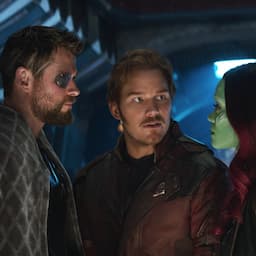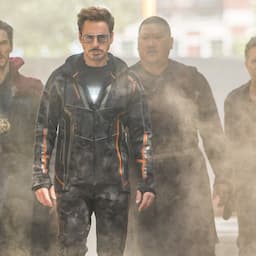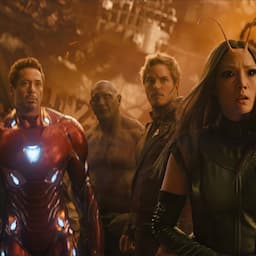Joe and Anthony Russo sat down with ET's Ash Crossan to talk all things 'Infinity War,' from Star-Lord's human moment to a surprise cameo from a Hollywood heavyweight.
Joe and Anthony Russo know you’re mad at Star-Lord.
But the directing duo have some defenses to plead on Peter Quill’s behalf -- along with some suggestions about who might really be to blame for the catastrophic finale of Avengers: Infinity War. Spoiler alert, if you somehow haven’t seen the movie -- or one of the thousands of memes it inspired -- but Thanos finally got his gauntlet together and turned half the world to dust with the most horrifying finger snap since symbiote-goth Peter Parker grooved his way down a New York City street in Spider-Man 3.
The Avengers, of course, had several chances to stop the internet’s favorite genocidal space daddy over the course of the film -- with one of the most frustrating misses coming when Chris Pratt’s Star-Lord, in a fit of anguish over Gamora’s sacrificial demise, starts throwing punches, breaking Mantis’ concentration powers over Thanos (literally, JUST AS THEY WERE ABOUT TO GET THE GAUNTLET OFF).
“I mean, look, he's a character who's gone through a lot of pain and he's lost a lot of people in his life,” Joe tells ET’s Ash Crossan, in defense of the half-Celestial’s very human moment. “He was kidnapped by pirates when he was 10 years old, raised by pirates, lost his mother, had to kill his father, and in the movie the love of his life is taken from him, so if you can't understand someone making a human choice like that, then I don't know if you understand humanity very well. He's just, he's a flawed character, that's what's so compelling about him.”
“That moment is very emotionally truthful,” Anthony adds. “I think that's why we bought it in the moment and that's why we loved it as a storytelling point, because it made him so vulnerable.”
The brothers also point out that Star-Lord isn’t the only Avenger to whiff when stepping up to bat against Josh Brolin’s big purple Big Bad. “There's lots of choices that characters have made throughout the movie that sort of led them to lose,” Anthony points out. “It wasn't simply that moment. If you go back to the end of Civil War, the entire rift between Cap and Tony is sort of a basis to why they lose in this film.”
“Thor gets the jump on Thanos at the end of the film, but instead of sort of killing him quickly, he sort of does it in a way where he can draw out his revenge and engage with Thanos in a way that arguably gave him a window to get away,” he adds. “That's what we love about these characters, you know? They're superheroes, they have amazing powers, but what makes them vulnerable is their emotional life and their emotional needs, and that's where things get complicated and that's where the story gets real.”
The Russos don’t seem to be struggling with the perceived backlash at all. If anything, Joe points out, it can become a teachable moment. “I think it's important to have empathy in life as much as have empathy for these characters so, if anything, for us, making challenging choices and flawed choices with the characters is a way for us to convey the notion that, you know, empathy... it's critical to living life properly.”
And just like their characters tackle agonizing choices over the course of Infinity War’s sprawling battles, the directing team were faced with the seemingly insurmountable task of bringing the MCU’s ever-expanding roster of heroes all together in a cohesive manner, while also building towards the final showdown in Wakanda. It was admittedly a “tough balance,” they say, with early drafts of the script featuring speaking parts in the triple digits and a Thanos narration that was later cut.
“We love the idea of these movies being a culmination of everything that's happened in the MCU, so our ambition as storytellers is to tell the total story and include as many characters as we can,” Anthony reflects. “Of course, we want to find the right balance to make sure we're not overreaching -- to make sure that the story that we are telling with each character is really compelling and rich.”
It was a feat that required a certain level of trust from the powers-that-be at Marvel, though the Russos admit there was one major character reveal that they got pushback on: a preliminary draft of the script that delayed Captain America’s entrance until well into the third act’s Wakandan war zone, ostensibly robbing viewers of this glorious shot:
“Basically everybody at Marvel, other than Joe and I, they were mad at us because he came into the movie so late,” Anthony recalls with a laugh. “We thought it was the right spot to do it, but after a while we kind of gave into everybody's [demand]: 'We need more Cap.'”
“He had Thor's heroic entrance into the Wakanda battle, that was originally Cap,” Joe adds. ”Our thinking was, you know, he was on the run, that nobody could find him, and so we thought it would be this really compelling way to use the character, especially ‘cause we're trying to thin the ranks out so that we could track everyone. Then we realized we had a really good spot to bring him in earlier in Scotland to save Vision and Wanda. So we started moving around heroic moments for characters.”
For the Russos, the choice harkened back to the point of human emotion and fallibility, illustrating the divide amongst the heroic team that ultimately lead to their downfall.
“The premise of the movie for us was always that, because of what happened in Captain America: Civil War, because Cap and Tony had the falling out, because the Avengers are divided, this is why they lose to Thanos,” Anthony explains. “[We were] playing with this idea that it's hard for Tony and Cap to get back together on the same team, and having Cap sort of be late to the party because they are forced to live underground and in hiding from the government. That was always the basic premise of the movie.”
Infinity War calls back to the brothers’ previous Marvel offering, Civil War, in more ways than one. In addition to fleshing out the consequences of Captain America’s rift with Iron Man, the film’s tragic ending also seemingly comes full-circle on a beloved Marvel character that the Russos helped introduce: Tom Holland’s Spider-Man, who falls victim to the Thanos Snap in a truly wrenching scene opposite Robert Downey Jr.
“We have a really close relationship with Tom Holland,” Joe says. “We fought for him in casting and it was a very specific interpretation of that character, because Spider-Man was my favorite character growing up and over the years he'd been played by actors who were in their 20s rather than an actor who was a teenager. I thought that was an integral part to translating Peter Parker on the screen, this youthful buoyancy… so, to take him on that journey, we knew it was going to be heartbreaking.”
“On set, watching it, I was tearing up because that's my favorite character,” he continues. “I had a feeling that would translate in a way that would be very painful to everyone else, so I thought, ‘If this this is hurting us watching it, then we're going in the right direction,’ because the point of the film is that, you know, sometimes villains win and not everybody makes it out alive.”
“And we have to give a lot of credit to Robert Downey Jr.,” Anthony adds. “He's an amazing performer, as we all know, but one of his great gifts is his ability to engage other actors… and sort of pull their best work out of them. I think you can see the relationship between Robert and Tom the entire way through -- they have that kind of dynamic between them.”
Another legendary acting moment (and Marvel meta milestone) opens the film, though most viewers may not have caught it upon first listen: Kenneth Branagh, who directed the first Thor film back in 2011, voices the off-screen Asgardian distress call as Thanos descends upon the vanquished planet’s surviving refugees.
“That’s literally one of those crazy ideas we had sitting in the edit room, I don't know, two or three weeks before we locked picture,” Joe recalls of casually adding another Hollywood heavyweight to the Marvel cinematic yearbook. “We're talking about, you know, we needed a great actor to open the film, that had that right gravitas and made you concerned for the Asgardians, and we went, 'Why don't we just ask Branagh? He's one of the greatest actors in the world.’ Luckily, he said yes.”
RELATED CONTENT:



